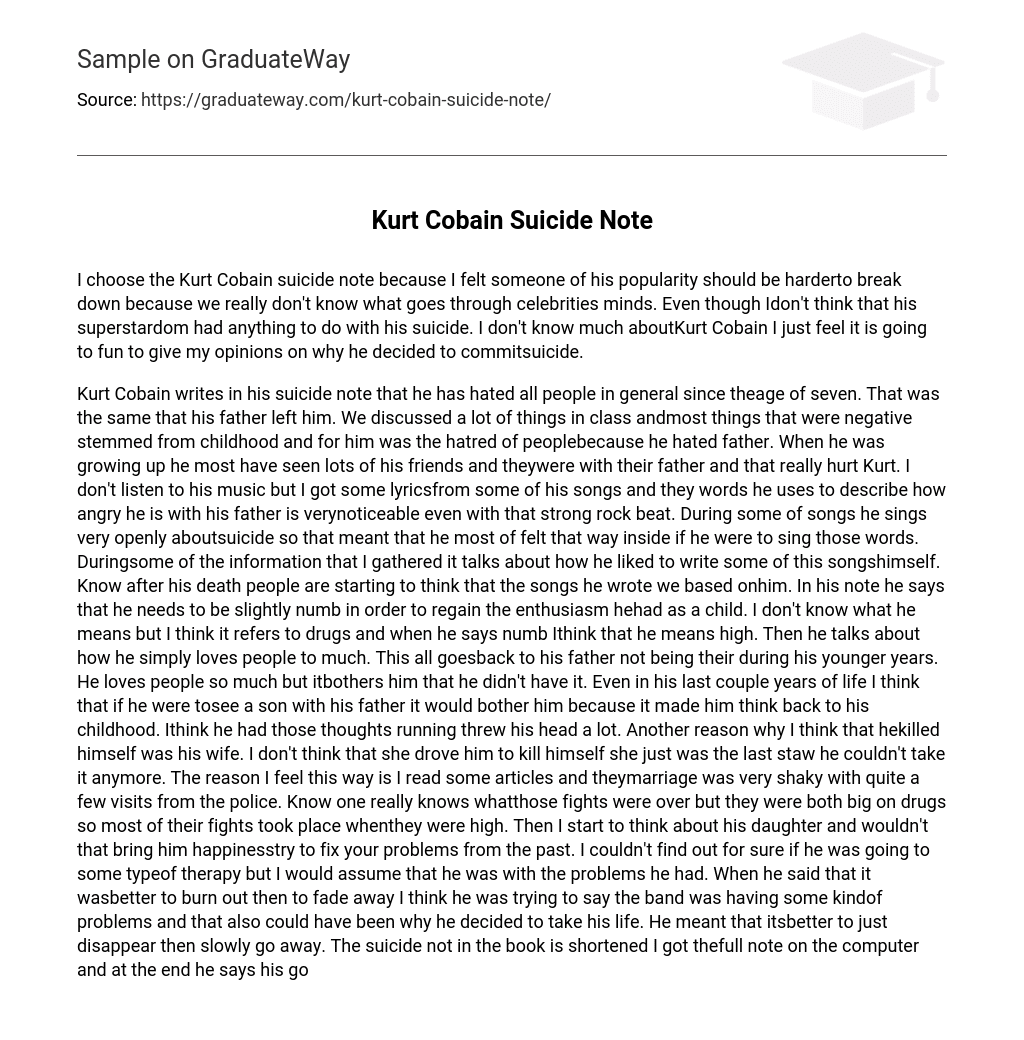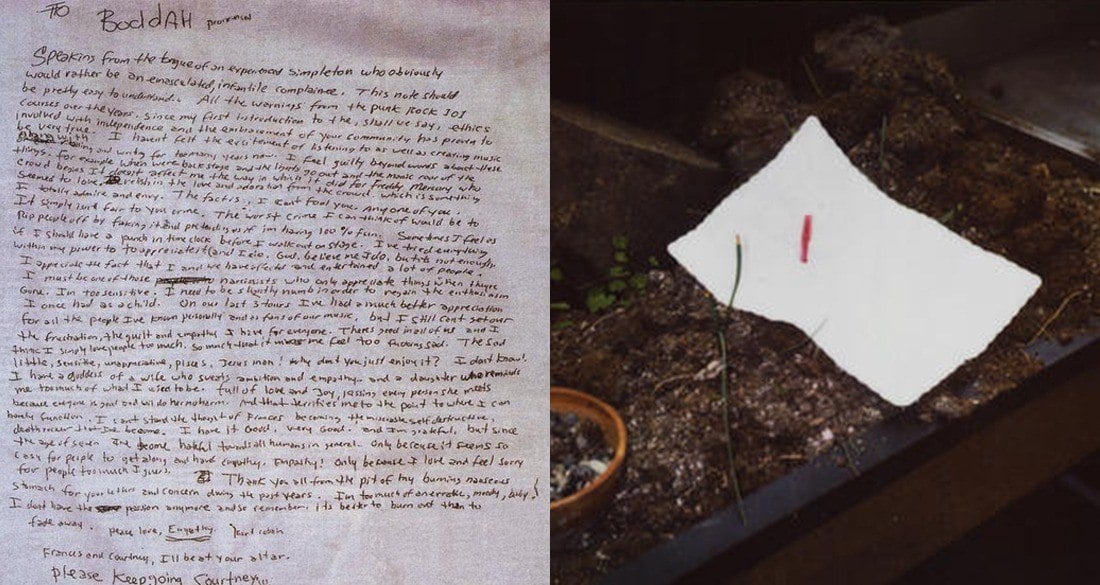Kurt Cobain, the legendary frontman of Nirvana, left behind a heart-wrenching suicide note that continues to resonate with fans worldwide. His tragic death in 1994 shocked the music industry and left an indelible mark on grunge culture. The suicide note, written in his own hand, has become one of the most analyzed and discussed documents in rock history. In this article, we will delve deep into the significance of Kurt Cobain's final words and explore their lasting impact.
Kurt Cobain's life and death have been the subject of countless discussions, books, and documentaries. As one of the most influential figures in the music world, his legacy continues to inspire new generations. His suicide note, a poignant reflection of his inner struggles, offers a glimpse into the mind of a deeply sensitive and complex individual.
Through this article, we aim to provide a detailed analysis of the note, its context, and the broader implications it holds for understanding mental health issues in the music industry. Let us begin by examining the life and times of the man behind the words.
Read also:Itsnatdog Onlyfans Leaked The Controversy And Facts You Need To Know
Table of Contents
- Biography of Kurt Cobain
- The Kurt Cobain Suicide Note
- Context of the Suicide Note
- Analysis of the Note
- Mental Health in the Music Industry
- Legacy of the Note
- Public Reactions and Interpretations
- Kurt Cobain and Grunge Culture
- Impact on Music
- Conclusion
Biography of Kurt Cobain
Early Life and Career
Kurt Donald Cobain was born on February 20, 1967, in Aberdeen, Washington. From a young age, he exhibited a passion for music and art. His parents' divorce when he was nine years old had a profound impact on his emotional development. Kurt struggled with feelings of alienation and depression throughout his life.
Data and Biodata
| Full Name | Kurt Donald Cobain |
|---|---|
| Birth Date | February 20, 1967 |
| Birth Place | Aberdeen, Washington, USA |
| Occupation | Singer, Songwriter, Guitarist |
| Band | Nirvana |
The Kurt Cobain Suicide Note
Kurt Cobain's suicide note, dated April 5, 1994, was found alongside his body in his Seattle home. Written in a heartfelt and raw style, the note expressed his deep despair and desire to escape the pressures of fame. It began with the famous line, "I haven't felt the excitement of listening to as well as creating music, along with really writing... for too many years now."
Key Points in the Note
- Expression of gratitude to his fans and friends
- Reflection on his childhood and early years
- Discussion of his struggles with fame and addiction
- Message to his daughter, Frances Bean Cobain
Context of the Suicide Note
The context of Kurt Cobain's suicide note is deeply intertwined with his personal battles and the pressures of being a global icon. At the time of his death, Cobain was grappling with severe addiction issues, chronic pain, and the overwhelming demands of stardom. The note provides a window into his inner world, revealing the complexities of his mental state.
Analysis of the Note
Themes and Messages
Upon analyzing the suicide note, several recurring themes emerge:
- Isolation: Cobain often felt disconnected from the world around him, despite his immense fame.
- Authenticity: He struggled to maintain his artistic integrity in the face of commercial success.
- Legacy: The note reflects his desire to be remembered for his music rather than his struggles.
Mental Health in the Music Industry
Kurt Cobain's suicide note has become a pivotal document in discussions about mental health in the music industry. Many musicians face similar challenges, including addiction, depression, and anxiety. Cobain's openness about his struggles has inspired others to seek help and address their own mental health issues.
Legacy of the Note
The legacy of Kurt Cobain's suicide note extends far beyond his personal story. It serves as a reminder of the importance of mental health awareness and the need for support systems within the music community. The note continues to resonate with fans who see it as a testament to Cobain's honesty and vulnerability.
Read also:New Way Bar Revolutionizing The Modern Bar Experience
Public Reactions and Interpretations
Fan Responses
Upon the release of the note, fans worldwide were left heartbroken and searching for meaning in its words. Many interpreted the note as a cry for help, while others saw it as a final act of rebellion against the constraints of fame.
Expert Opinions
Psychologists and music historians have analyzed the note extensively, offering insights into Cobain's state of mind. Some experts argue that the note reflects a lifelong struggle with depression, while others emphasize the role of external pressures in his decision.
Kurt Cobain and Grunge Culture
Kurt Cobain played a pivotal role in shaping grunge culture during the early 1990s. His raw, unfiltered approach to music and lyrics resonated with a generation seeking authenticity. The suicide note, in many ways, encapsulates the ethos of grunge—its focus on honesty, emotion, and individuality.
Impact on Music
The legacy of Kurt Cobain extends to the world of music, where his influence can still be felt today. Bands and artists continue to cite Nirvana as a major inspiration, and Cobain's suicide note has become a symbol of the challenges faced by musicians in the modern era.
Conclusion
Kurt Cobain's suicide note remains one of the most powerful and poignant documents in rock history. Through its raw honesty and emotional depth, it offers a glimpse into the mind of a genius struggling with the pressures of fame. As we reflect on Cobain's life and legacy, it is essential to remember the importance of mental health awareness and support for those in need.
We invite you to share your thoughts and reflections in the comments section below. For more articles on music, culture, and history, explore our website and discover new perspectives. Together, let us honor Kurt Cobain's memory by promoting understanding and compassion in all aspects of life.
References:


